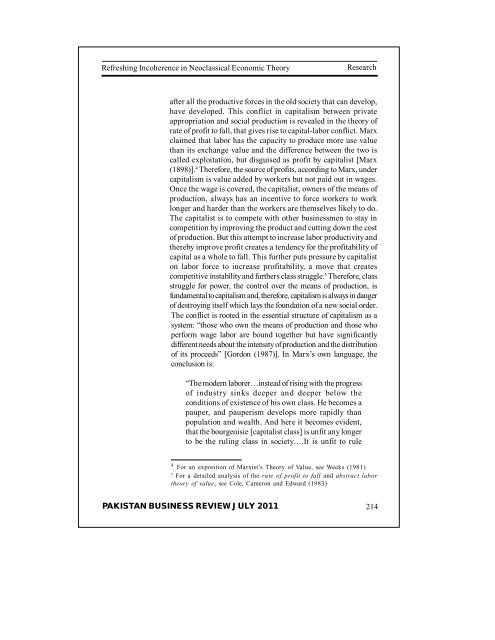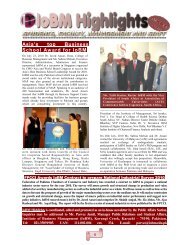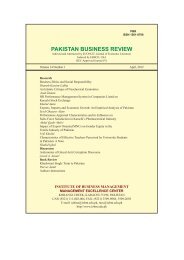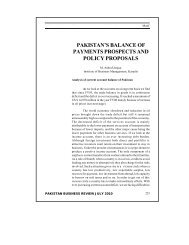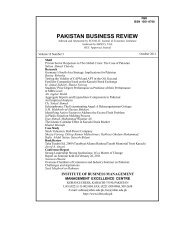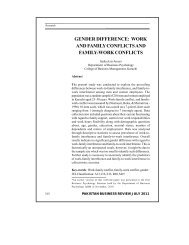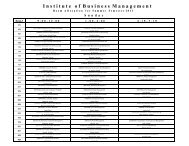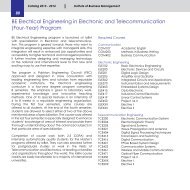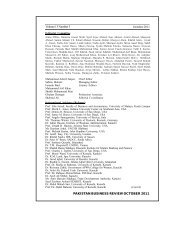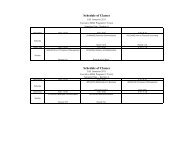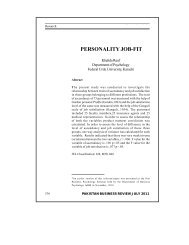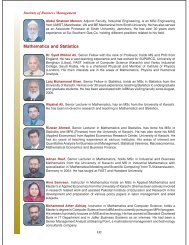PAKISTAN BUSINESS REVIEW - Institute of Business Management
PAKISTAN BUSINESS REVIEW - Institute of Business Management
PAKISTAN BUSINESS REVIEW - Institute of Business Management
Create successful ePaper yourself
Turn your PDF publications into a flip-book with our unique Google optimized e-Paper software.
Refreshing Incoherence in Neoclassical Economic Theory<br />
Research<br />
after all the productive forces in the old society that can develop,<br />
have developed. This conflict in capitalism between private<br />
appropriation and social production is revealed in the theory <strong>of</strong><br />
rate <strong>of</strong> pr<strong>of</strong>it to fall, that gives rise to capital-labor conflict. Marx<br />
claimed that labor has the capacity to produce more use value<br />
than its exchange value and the difference between the two is<br />
called exploitation, but disguised as pr<strong>of</strong>it by capitalist [Marx<br />
(1898)]. 4 Therefore, the source <strong>of</strong> pr<strong>of</strong>its, according to Marx, under<br />
capitalism is value added by workers but not paid out in wages.<br />
Once the wage is covered, the capitalist, owners <strong>of</strong> the means <strong>of</strong><br />
production, always has an incentive to force workers to work<br />
longer and harder than the workers are themselves likely to do.<br />
The capitalist is to compete with other businessmen to stay in<br />
competition by improving the product and cutting down the cost<br />
<strong>of</strong> production. But this attempt to increase labor productivity and<br />
thereby improve pr<strong>of</strong>it creates a tendency for the pr<strong>of</strong>itability <strong>of</strong><br />
capital as a whole to fall. This further puts pressure by capitalist<br />
on labor force to increase pr<strong>of</strong>itability, a move that creates<br />
competitive instability and furthers class struggle. 5 Therefore, class<br />
struggle for power, the control over the means <strong>of</strong> production, is<br />
fundamental to capitalism and, therefore, capitalism is always in danger<br />
<strong>of</strong> destroying itself which lays the foundation <strong>of</strong> a new social order.<br />
The conflict is rooted in the essential structure <strong>of</strong> capitalism as a<br />
system: “those who own the means <strong>of</strong> production and those who<br />
perform wage labor are bound together but have significantly<br />
different needs about the intensity <strong>of</strong> production and the distribution<br />
<strong>of</strong> its proceeds” [Gordon (1987)]. In Marx’s own language, the<br />
conclusion is:<br />
“The modern laborer…instead <strong>of</strong> rising with the progress<br />
<strong>of</strong> industry sinks deeper and deeper below the<br />
conditions <strong>of</strong> existence <strong>of</strong> his own class. He becomes a<br />
pauper, and pauperism develops more rapidly than<br />
population and wealth. And here it becomes evident,<br />
that the bourgeoisie [capitalist class] is unfit any longer<br />
to be the ruling class in society….It is unfit to rule<br />
4<br />
For an exposition <strong>of</strong> Marxist’s Theory <strong>of</strong> Value, see Weeks (1981)<br />
5<br />
For a detailed analysis <strong>of</strong> the rate <strong>of</strong> pr<strong>of</strong>it to fall and abstract labor<br />
theory <strong>of</strong> value, see Cole, Cameron and Edward (1983)<br />
<strong>PAKISTAN</strong> <strong>BUSINESS</strong> <strong>REVIEW</strong> JULY 2011<br />
214


